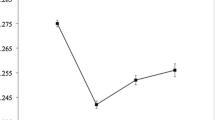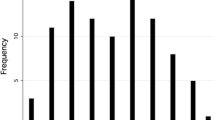Abstract
Professional team sports provide an ideal real world experiment to explore the effect of top executive replacement due to the availability of excellent performance data. This paper investigates how replacing the coach affects the performance of football teams. Analyzing almost 2,000 matches of the Austrian premier football league by ordinal (probit) regression techniques we find that a new coach tends to enhance team performance in home matches but to weaken it in away matches. However, neither of these effects turns out to be statistically significant. Nevertheless, the much discussed coach effect—ousting an underperforming coach in order to improve team performance at least temporarily—may make sense despite the costs involved by providing stronger ex-ante incentives for effort.


Similar content being viewed by others
Notes
Aside from the managerial focus of this study, sports results have been used to investigate numerous other questions, e.g. racial biases (Madden (2004) shows that Afro-American coaches in the NFL have been more successful and Szymanski (2000) finds a similar racial bias of overpaying white players in English football) or game theoretic considerations on tactics (e.g. Palomino et al. 2000). Chiappori et al. (2002) use data on football penalties to demonstrate the use of mixed strategies.
e.g. Bernstein (1998) calls Michael Milken and T. Boone Pickens heroes, because they have revolutionized the notoriously lazy American management (a point that should not be forgotten in the current debate about ‘locusts’ and corporate governance).
The logit model assumes the simpler logistic cumulative distribution that was also fitted but its discussion is here suppressed due to very similar results.
Clubs recently joining the Bundesliga have been assigned the lowest rank, i.e., 10.
All regressions were performed with SPSS Version 11.5 using ‘plum’.
Regressions were performed for stx j and sty j up to j = 5 and including all five, with the lowest relative standard error for the coefficient of the coach effect for j = 3 (i.e., the 3rd game) but remaining insignificant at usual levels. The logit specification yields identical results with respect to significance (Pseudo-R2s in the order of 0.10 are all alike, with probit showing a little better fit). A binary differentiation––lose, not lose––does not alter these conclusions either. Details are available upon request.
This incentive is well expressed by Michael Owen, a professional football player from the English Premier League: “It'll be another challenge now for all the lads to impress the new manager, whoever he may be. Even if he knows what you can do, you'll still have to convince him you should be in his plans.” (http://www.liverpoolfc.tv/news/archivedirs/features/2000/oct/F149010320-1904.htm also quoted in Höffler and Sliwka (2003)).
References
Allen MP, Panian SK, Lotz RE (1979) Managerial succession and organizational performance: a recalcitrant problem revisited. Adm Sci Q 24:167–180
Audas R, Dobson S, Goddard J (2002) The impact of managerial change on team performance in professional sports. J Econ Bus 54:633–650
Bernstein PL (1998) Are networks driving the economy? Harvard business review November–December 1998, pp 159–166
Bonnier K, Bruner RF (1986) An analysis of the stock price reaction to management change in distressed firms. J Account Econ 11:95–106
Brown CM (1982) Administrative succession an organizational performance: the succession effect. Adm Sci Q 27:1–16
Chiappori PA, Levitt S, Groseclose T (2002) Testing mixed-strategy equilibria when players are heterogeneous: the case of penalty kicks in soccer. Am Econ Rev 92:1138–1151
Cools K, van Praag M (2003) The value relevance of forced top management departures: Dutch evidence, Tinbergen institute discussion papers 03–051/3. http://www.tinbergen.nl/discussionpapers/03051.pdf, (02.12.2003)
Dedman E, Lin S (2001) Shareholder wealth effects of CEO departures: evidence from the UK. J Corp Finance 8:81–104
Denis DJ, Denis DK (1995) Performance changes following top management dismissals. J Finance 1:1029–1055
Forbes (2006), Soccer team valuations. http://www.forbes.com/lists/2006/34/Rank_1.html
Gaede N, Kleist S, Schaeke M (2002) Elf Freunde müsst ihr sein: Die strategische Entscheidung der Teamzusammensetzung. In: Schewe G, Littkemann J (eds) Sportmanagement: Der Profifußball aus sportökonomischer Perspektive. Schorndorf, pp 99–114
Gres A (2002) Gibt es einen Heimvorteil in der österreichischen Fußballbundesliga? Diplomarbeit an der Wirtschaftsuniversität Wien
Gruppe Fischer Gärtner Management Consulting, Spektrum (1997) Eine neue Führung ist Spitze. http://www.spektrum-online.de/fuehrungswechsel/spitze.pdf, (Nov. 2nd 2003)
Grusky O (1963) Managerial succession and organizational effectiveness. Am J Sociol 69:21–31
Höffler F, Sliwka D (2003) Do new brooms sweep clean? When and why dismissing a manager increases the subordinates performances. Eur Econ Rev 47:877–890
Kaplan SN (1994) Top executives, turnover & firm performance in Germany. J Law, Econ Organ 10:142–159
Khanna N, Poulsen AB (1995) Managers in financially distressed firms: villains or scapegoats? J Finance 50:919–940
Kicker Sportmagazin, 30.7.2001, 20
Koning RH (2000) An econometric evaluation of the firing of a coach on team performance. Appl Econ 35:555–564
Kreps DM, Wilson R (1982) Reputation and imperfect information. J Econ Theory 27:253–279
Madden Janice Fanning (2004) Differences in the success of NFL coaches by race, 1990–2002: evidence of last hire, first fire. J Sports Econ 5:6–19
McClosekey DN, Ziliak ST (1997) The standard error of regressions. J Econ Lit 34:97–114
Milgrom P, Roberts J (1982) Predation, reputation, and entry deterrence. J Econ Theory 27:280–312
Mulherin K, Poulsen A (1998) Proxy contest and corporate change: implication for shareholder wealth. J Financ Econ 47:279–313
Palomino F, Rigotti L, Rustichini A (2000) Skill, strategy and passion: an empirical analysis of soccer, mimeo. University of Tilburg
Porter PK, Scully GW (1982) Measuring managerial efficiency: the case of baseball. South Econ J 48:642–650
Salomo S, Teichmann K (1999) Team performance and management change: some evidence from the German Premier Soccer League, in Proceedings to the 7th congress of the European association for sport management, Thessalonica 1999, 1–5. http://www.bwl.uni-kiel.de/bwlinstitute/Organisation/pdf/teichmann/artikel3.pdf (Nov. 4th 2003)
Schrader S, Lüthje C (1995) Das Ausscheiden der Spitzenführungskraft aus dem Unternehmen: Eine empirische Analyse. Zeitschrift für Betriebswirtschaftslehre 5/64:467–493
Schewe G (2002) Der Fußball-Verein als Kapitalgesellschaft: Eine kritische Analyse der Corporate Governance. In: Schewe G, Littkemann J (Hrsg.) Sportmanagement: Der Profifußball aus sportökonomischer Perspektive., Schorndorf, pp 163–176
Sport1.at 2003: http://www.sport1.at (Dec. 12th 2003)
Szymanski S (2000) A market test for discrimination in the English Professional Soccer Leagues. J Polit Econ 108:590–603
Szymanski S (2003) The economic design of sporting contests. J Econ Lit XLI:1137–1187
The Economist (2002) Passion, pride and profit. A survey of football. June 1st, 2002, 10
Warner J, Watts R, Wrack K (1988) Stock prices and top management change. J Financ Econ 20:461–492
Author information
Authors and Affiliations
Corresponding author
Rights and permissions
About this article
Cite this article
Wirl, F., Sagmeister, S. Changing of the guards: New coaches in Austria’s premier football league. Empirica 35, 267–278 (2008). https://doi.org/10.1007/s10663-008-9063-6
Received:
Published:
Issue Date:
DOI: https://doi.org/10.1007/s10663-008-9063-6




